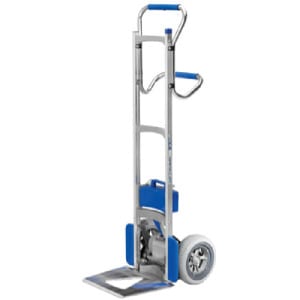What are the best casters to choose for moving materials outdoors? Like so many of life’s big questions, the answer is – it depends.
Will the casters be outdoors 100% of the time, or will they move back and forth between indoors and out? Will they be pushed slowly by hand over perfectly smooth pavement, or will they be towed over broken, cracked and debris-covered surfaces? Is the load hardy and durable, or fragile and easily damaged?
We’ll discuss answers to these questions and others, and describe some of the factors that come into play when casters need to perform outdoors. We’ll then look at three examples – dumpsters, grocery carts, and bellman carts to and see how caster choices are affected by outdoor operating conditions.
Outdoors – Where the Going Gets Rough
Simply by moving items from comfortable indoor conditions to the less predictable ones found outdoors, many more requirements have now been placed on casters.
- Moisture Resistance – If your equipment remains outside under all weather conditions, then it will be important to choose casters that will not corrode under wet conditions. This may cause you to rule out cast iron or steel casters in favor of materials like stainless steel or polyurethane.
- Ultraviolet (UV) Resistance – When choosing casters for outdoor use, make sure they can stand up to the sun. Sunlight can be harsh on plastics and other materials. To avoid damage from the sun, special UV inhibitors can be added to plastic resin compounds that are nearly impervious to sun damage.
- Impact Resistance – Rolling casters outdoors introduces new types of jolts and jars not often found indoors. Outdoor pavement is more likely to have debris like rocks or stones, which can cause sharp impacts on rolling casters.
- Vibration Characteristics – The roughness of outdoor conditions can cause increased vibrations. If this is a problem, you may want to choose softer wheel materials to help dampen the vibrations.
- Load Cushioning and Protection – In some situations, load protection is not a concern. For example, broken concrete in a dumpster is impervious to damage. But if you’re moving fragile artwork from a delivery truck to an auction hall, you’ll want to choose casters that can help protect your load.
- Variety of Surfaces – Outdoor equipment may need to function well on asphalt, concrete, and even gravel and dirt. If it must also be used indoors on floors such as wood, linoleum or tile, choosing the right caster becomes extremely important.
Next, let’s see how some of the factors mentioned above influence caster choices on three different pieces of equipment.
Dumpsters
Casters selected for use on dumpsters must stand up not only to extremes of high and low temperatures, rough pavement, and moisture from snow, sleet and rain – they must also resist the impact of being picked up and slammed into the ground when they are emptied
While some dumpsters remain stationary, others will be wheeled from an indoor trash room, where they are parked under a trash chute, to the outdoor location where they will be emptied into a garbage truck.The casters on dumpsters, therefore, may need to travel on a variety of pavement materials, from unpaved surfaces such as gravel or dirt, to asphalt or concrete.
Polyurethane is often a good choice for a wheel material used on dumpster casters. It is extremely durable, has a high strength-to-weight ratio, stands up well under heavy loads, and has good impact resistance that helps avoid damage from being dropped onto the ground. Polyurethane will also help protect pavement materials in situations where that is a concern.
Grocery Carts
The casters on grocery carts must perform well in the extreme conditions of a supermarket parking lot. There, they may encounter extreme cold in the winter, blazing heat in summer, be drenched by rain or slush, suffer under the impact of bumping into curbs when steered by shoppers or into other carts when store employees collect them throughout the day.
After undergoing all of those tough conditions, they must perform quietly and smoothly once inside the store – not tracking in debris from outdoors, not marking the clean, polished floors of the store, while always rolling smoothly as customers push the carts down aisles.
Because these casters should be durable and very low maintenance, it might seem that caster wheels made from rigid plastic might be a good choice. A softer material works better however, because vibrations caused by rolling across rough asphalt parking lots will be better dampened, which helps cushion customers’ hands and arms from being jolted and shaken. Softer wheel material will also be much quieter when the cart is used inside the grocery store.
Hotel Bellman Carts
While the casters used on bellman carts must function well outdoors as well as indoors, one of the chief requirements is that the casters cushion and protect the load that is often expensive luggage or fragile personal belongings. The outdoor pavement and indoor floor surfaces while varied, are generally well maintained and don’t pose much of a challenge for the casters. Indoor floor protection is important; the casters must not mark the floors, nor scrape or gouge surfaces like tile, wood, or carpet.
Pneumatic or semi-pneumatic wheels make good choices for bellman cart casters. They can be specified with a tread design that will not track snow or rain into the hotel lobby. Their air-filled inner chambers (pneumatic wheels), or rubber-filled composition (semi-pneumatic),cushion bumps and jolts, and does a good job of protecting customers’ luggage.
What’s the Best Caster for Outdoors?
We hope the information above has given you plenty to think about and helped you begin the process of selecting your casters. Contact the caster experts at Douglas Equipment toll free at 800-451-0030 or 305-888-3700 or online through our contact form. We’ll help you pick the right casters for your outdoor conditions!





